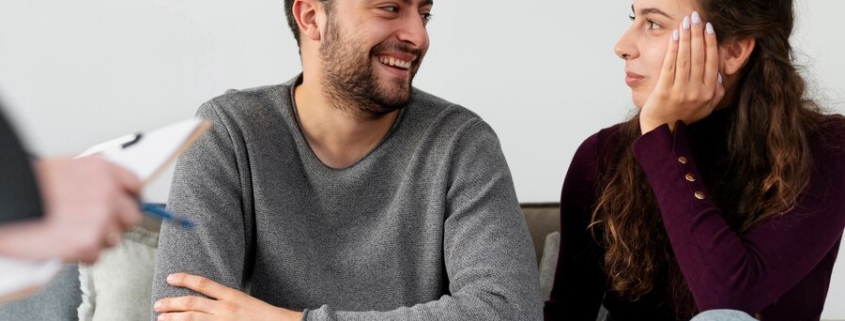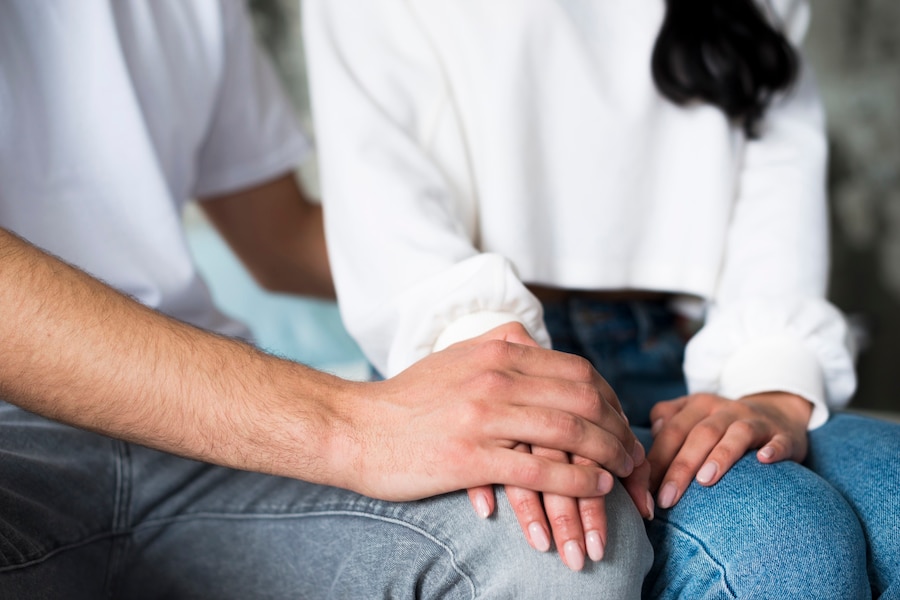Embarking on the journey to recovery from addiction is a courageous step, but for couples navigating this path together, the road may be fraught with unique challenges. Triggers—those moments, situations, or emotions that evoke cravings or negative behaviors—can be particularly potent in a couple’s journey to sobriety. Recognizing this, couples rehab in Orange County offer specialized support and guidance to help couples identify, understand, and navigate triggers together. In this insightful exploration, we delve into how couples rehab equips couples to face triggers head-on, fostering resilience, communication, and growth in their journey to lasting recovery.
Couples Rehab Services
Understanding Triggers in the Context of Relationships
Triggers are often deeply intertwined with the dynamics of relationships, making them especially challenging for couples in recovery. These triggers can stem from past traumas, unresolved conflicts, or unhealthy patterns of communication within the relationship. Additionally, external factors such as social situations, financial stressors, or family dynamics may also serve as triggers for one or both partners. Couples rehab programs provide a safe and supportive space for couples to explore the roots of their triggers and gain insight into how they manifest within their relationship dynamic.
Individual and Couples Counseling
One of the cornerstones of couples rehab programs is the provision of both individual and couples counseling. This dual-focused approach allows each partner to address their personal triggers and challenges in a confidential setting while also providing opportunities for couples to work through shared triggers and relationship dynamics together. Individual counseling sessions provide a platform for partners to delve into their personal histories, traumas, and triggers, while couples counseling sessions facilitate open communication, conflict resolution, and the development of healthy coping strategies as a couple.
Identifying Triggers and High-Risk Situations
In couples rehab, couples are guided through a process of identifying their triggers and recognizing high-risk situations that may lead to relapse or conflict. Through psychoeducation, mindfulness exercises, and self-awareness practices, couples learn to identify the thoughts, emotions, and behaviors that precede their triggers and develop strategies for managing them effectively. By gaining a deeper understanding of their triggers, couples are better equipped to anticipate and navigate challenging situations together, reducing the likelihood of relapse and strengthening their bond in the process.
Developing Coping Skills and Strategies
Couples rehab programs offer couples a toolkit of coping skills and strategies to help them effectively manage triggers and cravings as they arise. These may include mindfulness techniques, relaxation exercises, stress management strategies, and communication skills training. Couples learn how to communicate openly and honestly with each other about their triggers and cravings, seek support when needed, and implement healthy coping mechanisms to prevent relapse and maintain sobriety. By practicing these skills together, couples build resilience and confidence in their ability to navigate triggers as a team.

Creating a Trigger Action Plan
In couples rehab, couples work collaboratively with their therapists to develop a personalized trigger action plan—a proactive strategy for identifying, addressing, and mitigating triggers in their daily lives. This action plan may include specific coping strategies, communication techniques, and lifestyle adjustments tailored to the couple’s unique needs and triggers. By creating a plan together, couples feel empowered and prepared to face triggers as they arise, knowing that they have a roadmap for navigating challenges and supporting each other through difficult moments.
Strengthening the Relationship Bond
Ultimately, couples rehab programs aim to strengthen the bond between partners and cultivate a supportive and resilient relationship foundation. Through shared experiences, mutual support, and effective communication, couples learn to lean on each other for strength and encouragement as they navigate the ups and downs of recovery together. By facing triggers as a team and working through challenges hand-in-hand, couples deepen their connection, trust, and intimacy, laying the groundwork for a healthier and more fulfilling relationship in sobriety.
Ongoing Support and Aftercare
Couples rehab programs recognize that the journey to lasting recovery extends beyond the confines of the treatment center. Therefore, they provide comprehensive aftercare support to help couples maintain their sobriety and navigate challenges in the long term. This may include access to support groups, alumni programs, individual counseling sessions, and community resources tailored to the needs of couples in recovery. By staying connected to a supportive network and continuing to prioritize their relationship and sobriety, couples can sustain the progress made in rehab and build a fulfilling life together free from the grip of addiction. Ongoing support and aftercare serve as vital lifelines for couples as they transition back into their daily lives, providing encouragement, accountability, and guidance every step of the way.
Discover How Couples Rehab Equips You to Face Challenges Together
Triggers are an inevitable part of the recovery journey, but with the support of couples rehab, couples can learn to face them with resilience, understanding, and unity. By understanding the roots of their triggers, developing coping skills, and strengthening their relationship bond, couples emerge from rehab equipped with the tools and confidence to navigate life’s challenges together, one trigger at a time. If you and your partner are struggling with triggers in your journey to recovery, consider the transformative support offered by couples rehab programs, where you can find guidance, healing, and hope for a brighter future together.

FAQs
1. What are triggers, and why are they important to address in couples rehab? Triggers are anything that can cause a person to experience cravings or relapse into substance use. In couples rehab, it’s crucial to address triggers because they can impact both partners’ recovery journeys and the dynamics of their relationship.
2. How does couples rehab help couples navigate triggers together? Couples rehab equips couples with tools and strategies to recognize and cope with triggers effectively. Through therapy sessions, couples learn how to support each other during challenging moments, identify triggers specific to their relationship, and develop healthy coping mechanisms.
3. What are some common triggers that couples may face in recovery? Common triggers in recovery may include stress, conflict in the relationship, social situations involving alcohol or drugs, anniversary dates of past substance use, and exposure to certain environments or people associated with substance use.
4. How does Couples Rehab address individual triggers while supporting the couple as a unit? Couples Rehab takes a comprehensive approach to address individual triggers while supporting the couple as a unit. Therapists work with each partner individually to identify personal triggers and develop coping strategies. Additionally, couples participate in joint therapy sessions where they learn to navigate triggers together.
5. What role does communication play in navigating triggers in couples rehab? Communication is essential in navigating triggers in couples rehab. Couples learn how to communicate openly and honestly about their triggers, feelings, and needs. Effective communication helps partners support each other through difficult moments and work together to prevent relapse.
6. How do therapists at Couples Rehab help couples identify and understand their triggers? Therapists at Couples Rehab use evidence-based techniques to help couples identify and understand their triggers. Through individual and couples therapy sessions, therapists explore past experiences, patterns of behavior, and relationship dynamics to uncover underlying triggers.
7. Can couples expect to face triggers even after completing rehab? Yes, it’s common for couples to face triggers even after completing rehab. Recovery is an ongoing process, and triggers may arise unexpectedly. However, couples learn valuable skills in rehab to recognize and manage triggers effectively, empowering them to navigate challenges together.
8. What support systems are available to couples outside of therapy sessions to help navigate triggers? Outside of therapy sessions, couples have access to various support systems to help navigate triggers, including support groups, sober social networks, and aftercare programs. These resources provide ongoing support and reinforcement of the skills learned in rehab.
9. How does Couples Rehab empower couples to face triggers as a team? Couples Rehab empowers couples to face triggers as a team by fostering a supportive and collaborative environment. Through joint therapy sessions and experiential activities, couples practice navigating triggers together, strengthening their bond and resilience as a team.
10. How can couples take the first step towards navigating triggers together with Couples Rehab? Couples interested in navigating triggers together with Couples Rehab can start by contacting the admissions team for a confidential assessment. From there, the program can tailor a treatment plan to address their specific needs and goals in overcoming triggers and maintaining sobriety together.



